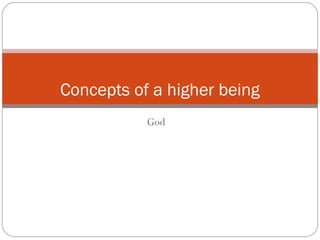
The idea of God
- 1. God Concepts of a higher being
- 2. Introduction Philosophy of religion examines the nature of religion, explores rational arguments for and against various religious views, analyses the nature of religious language and explores the variety of human religious experience. This theme allows you to explore philosophically such questions as: Can we prove the existence of a higher being through reasoning or experience? Can morality be based on religious experience? What is the nature and scope of religious language? Can religion give meaning to life? Is spirituality possible without religion or belief in a higher being? Could religion only be seen as a social phenomena?
- 3. A religious worldview; the lense in which we view the world What do we mean by the term God? Man, woman or being? Eternal, created or creator? God for all or for few? Of this world or out of this world? Attempting to understanding of the nature of God is a timeless and universal search. There are multiple responses to the concept of the divine. Question- Can you define ‘God’? What has shaped your understanding of the this concept?
- 4. The divine attributes Omnipotence (All powerful) - God is perfect and has the most perfect power. Power in this sense is the ability to do things and to change things. Some philosophers have argued that logic is no limit on God’s power. However; many would say that there is no way this an meaningfully be true. With this in mind almost all philosophers have restricted omnipotence to the power to do anything that is logically possible.
- 5. Omniscience (All knowing) - This term traditionally associated with the monotheistic faiths (Judaism, Christianity and Islam). The most obvious definition of omniscience is ‘knowing everything’, but we need to remember that even though God is the most perfect possible being, it is perhaps impossible to know everything. For example, if human beings have free will then God may not be able to know what they will do in the future. So being omniscience, God knows all the truths possible to know.
- 6. Omnipresent (All Present) - God is everywhere. He is intimately familiar with his creation and works though and is present in humanity. God’s presence is reflected in his creation. God can be ‘present’ in two ways….
- 7. By being… Transcendent - God transcends the natural dimension, he is ‘outside’ of or goes beyond the universe. God is the creator but is not created as God is self sufficient. God exists outside the realm of time and space and is not subjected to the laws of physics. Immanent - God also exists within this dimension. God being immanent makes the close connection between God’s existence and the existence of everything in the natural realm. God exists here and there; in everything that exists ‘God is there’. God is active and present in human history. Immanence is necessary to ensure that God is not remote from us.
- 8. Approaches to the divine Theism- is the belief in a creator who displays the qualities as mentioned in this power point: transcendent, immanent, personal, eternal, all knowing, all powerful, all present. This is the belief in the existence of God. Atheism- is the conviction that there is no divine being or transcendent dimension. Agnosticism- Uncertainty as to the existence of the divine. Pantheism-is the belief that God is within everything. Deism- is the belief of an external God who created the world, but is not immanent within it.
- 9. Some key points Traditional conceptions of God stem from the idea that God is the most perfect possible being. God is personal: God has traits similar to those of a person, such as intellect and will. Omniscience: God knows everything possible to know. God knows this directly and immediately. Omnipotence: God has the power to do anything that is possible to do. Perfect goodness: God is the most perfect possible being. God’s will is in accordance with moral values. Transcendence and immanence: God is more than the universe, being outside time and space yet also existing throughout everything that exists. God exists without beginning or end: God is eternal.
- 10. Questions for discussion How can God be considered personal; however, cannot be thought of as a person? Can God know everything? What are the implications of this possibility? Explain the contrast between God as a transcendent being and God as an immanent being. Can you think of religious traditions who believe in one or the other?